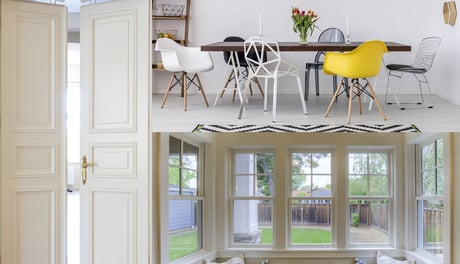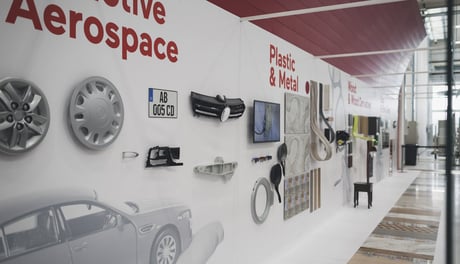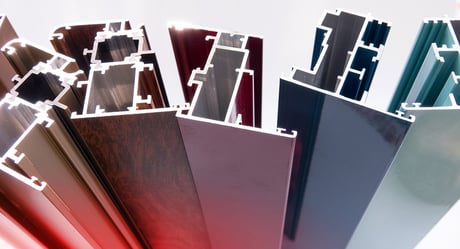
➡️ Excimer ovens
Excimer Ovens represent the new frontier for manufacturers aiming to obtain ultra-matt surfaces, thanks to excimer technology.
Application fields: sectors using industrial ovens
Thanks to these technologies, capable of meeting highly diverse needs, industrial ovens have become indispensable in numerous sectors, including those with highly specific processing requirements.
In metallurgy, for instance, ovens are used for heat treatments such as annealing, tempering and hardening of steel and alloys to improve their mechanical properties and durability. In ceramics and glass processing, by contrast, they are mainly used for firing clay products and for glass tempering and annealing.
Companies in the electronics sector rely on industrial ovens for curing coatings, soldering and assembling components made from extremely delicate materials, which therefore require total temperature control.
It should also be remembered that in the food industry, processes such as cooking, drying, roasting and sterilisation are managed by specialised ovens that guarantee safety and preserve the organoleptic properties of processed products.
Finally, for those working in paints and coatings, these machines facilitate the drying and curing of paints, enamels and powder coatings to improve finishing quality and increase product durability. But the curing of composite materials is also essential in aerospace, automotive, sporting goods and furniture production.
Cefla Finishing has extensive experience serving all these sectors, continuing to develop advanced, integrable solutions to meet specific process requirements and evolving industry standards.
Why invest in a modern industrial oven: efficiency and benefits
Investing in a modern industrial oven, on the other hand, offers numerous benefits. In summary:
✅ Better product quality
Precise temperature control, uniform heat distribution and programmable cycles ensure consistent, high-quality results, reducing defects and rework.
In addition, careful management of cleanliness and air quality in the processing environment helps protect treated materials, ensuring flawless and consistent finishes in every production run.
✅ Increased productivity
Advanced ovens with automation features enable faster cycle times, higher production capacity and reduced downtime.
✅ Energy efficiency and sustainability
By integrating thermal insulation mechanisms, heat recovery systems and efficient burners, these machines significantly reduce energy consumption and operating costs, helping companies align with sustainability goals and market expectations.
✅ More accurate control and process automation
The implementation of intelligent controls, sensors and data recording allows meticulous process monitoring, which can be optimised in real time.
✅ Reliability and reduced maintenance
New-generation solutions are designed to last: they exploit components that require less frequent maintenance and leverage modularity to facilitate part replacement.
✅ Regulatory compliance
Updated safety features and compliance with industry standards safeguard worker safety and ensure compliance with environmental and safety regulations.
How to choose the right industrial oven for your production needs
Maximising these benefits means making a wise investment: choosing the most suitable industrial oven for your production requirements requires careful assessment. Several key factors determine a successful implementation. Cefla Finishing has identified eight, covering the full range of parameters to consider before investing in these solutions.
1) The process to support
First of all, it is necessary to establish what the oven will be mainly used for: evaporation, drying or curing? Substrates, coatings and processes all imply specific requirements in terms of temperature, atmosphere and cycle handling.
2) Temperature range and control accuracy
Next, it is necessary to determine the maximum temperature required for processing, as well as the tolerance needed to maintain process consistency. Some applications demand minimal tolerance, while others can allow for a wider temperature delta.
3) Dimensions and production capacity
It may sound obvious, but it is essential to assess the volume of products to be processed daily and the useful load capacity. Machine footprint, internal oven dimensions and the number of items it can handle per cycle must therefore be considered.
4) Materials to be processed
Different materials (wood, metals, ceramics, polymers) have specific thermal properties and sensitivities. It is therefore necessary to select an oven that takes into account the characteristics of the material and the required finish.
5) Energy source
Based on the above considerations, one must choose between different heating systems: hot water exchangers, electric, gas or hybrid, depending on energy costs and supply availability, but also taking into account environmental regulations and the plant’s sustainability objectives.
6) Energy efficiency and operating costs
This may seem like a reiteration of the previous point, but assessing the energy efficiency of an industrial oven is actually a subject in its own right. When choosing a solution that represents a long-term investment, it is strategic to consider all operating costs, including energy supply.
7) Automation and control
What, finally, is the desired level of automation throughout the process? Advanced oven models integrate PLC controls, sensors and data recording systems that help optimise operations and ensure repeatability.
8) Budget
Last but not least, the matter of financial resources. It is necessary to balance initial investment with operating costs, maintenance and expected service life: in this sense, high-performance ovens may involve a higher initial outlay, but a lower total cost of ownership.
Starting from the analysis of these factors to make an informed decision is essential when choosing an oven in line with production goals, budget and company growth plans.
That said, flexibility remains a fundamental characteristic in a market that requires the ability to manage small production batches without sacrificing the ability to scale when necessary. At Cefla Finishing we know this well, which is why we design and manufacture a wide range of finishing systems where modularity is a critical success factor: this is the only possible way to create solutions that can be extensively customised in relation to all the parameters just highlighted.

Maintenance and safety: ensuring long life and efficiency of your oven
Choosing the most suitable solution for your needs is important, but so is a correct approach to maintenance. Compliance with safety protocols is also crucial to maintaining high efficiency and extending the service life of industrial ovens.
Regular preventive maintenance includes routine checks of electrical connections, heating elements, fans and insulation. Cleaning filters, replacing worn components and verifying control systems help maintain optimal performance and prevent failures, which inevitably lead to costly downtime.
Ovens, moreover, must be equipped with advanced safety devices, starting with emergency shutdown systems, thermal switches and over-temperature alarms. Adequate ventilation of the production areas is also essential.
At Cefla Finishing, we are committed to supporting customers even after the initial installation: we offer comprehensive after-sales services, including scheduled maintenance sessions, remote diagnostics and rapid technical assistance. It is therefore a genuine long-term partnership, ensuring that the purchased solutions remain reliable, efficient and safe throughout their operational life, minimising downtime and safeguarding workforce safety.
LOOKING FOR THE IDEAL SOLUTION FOR YOUR COATING LINE?











